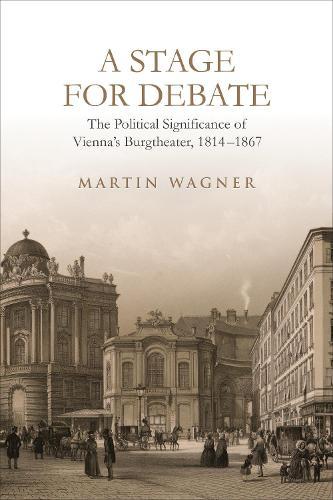Overview
This book examines Vienna's Burgtheater, the most prestigious German-language stage in the nineteenth century. A Stage for Debate presents a detailed analysis of the repertoire of the leading German-language stage of the nineteenth century, Vienna's Burgtheater. The book explores the extent to which the Burgtheater repertoire contributed to important political and cultural debates on individual liberty, the role of women in society, and the understanding of national and regional identity. The relevance of the Burgtheater as a forum for political debate is assessed not by the degree to which the performed plays transgressed established norms, but by the range of positions that were voiced on a given topic. Martin Wagner investigates the roughly 1,000 plays from across Europe that were introduced to the Burgtheater's repertoire between 1814 and 1867 by combining a general overview with detailed interpretations of especially successful plays. Wagner reveals that the Burgtheater was significantly more involved in contemporary debates than the stereotype of this stage as an artistically refined but apolitical institution suggests. Drawing from theatre studies and German and Austrian studies more broadly, A Stage for Debate revises the history of one of Europe's leading theatres.
Full Product Details
Author: Martin Wagner
Publisher: University of Toronto Press
Imprint: University of Toronto Press
Volume: 49
Dimensions:
Width: 15.90cm
, Height: 1.90cm
, Length: 23.60cm
Weight: 0.440kg
ISBN: 9781487509552
ISBN 10: 1487509553
Pages: 232
Publication Date: 07 June 2023
Audience:
College/higher education
,
Professional and scholarly
,
Tertiary & Higher Education
,
Professional & Vocational
Format: Hardback
Publisher's Status: Active
Availability: Temporarily unavailable

The supplier advises that this item is temporarily unavailable. It will be ordered for you and placed on backorder. Once it does come back in stock, we will ship it out to you.
Reviews
"""Contesting previous dismissals of the Burgtheater as a conservative bastion or a site for frivolous entertainment in the mid-nineteenth century, Martin Wagner compellingly argues that a diverse dramatic repertoire and heterogenous audience made Vienna's court theatre an important site for public political debate, particularly for Austrian liberalism. This clearly written and well researched book is an essential new resource not only for scholars of Austrian and German theatre, but also for any historian of the Habsburg empire."" - S.E. Jackson, Associate Professor of German and Scandinavian Studies, University of Massachusetts Amherst ""Despite rigorous Hapsburg censorship, the Vienna Burgtheater developed during the mid-nineteenth century an impressive range of dramatic discussion of such burning questions as individual liberty, nationalism, and women's role in society. This illuminating study reveals how one of Europe's most significant theatres dealt with such questions during a critical period in its history."" - Marvin Carlson, Distinguished Professor Emeritus and Sidney E. Cohn Chair in Theatre Studies, City University of New York ""Martin Wagner's book is a thought-provoking study into the relations between literature, theatre, and society. His in-depth analysis of the Vienna Burgtheater's polyphonic repertoire shows that in spite of severe censorship the first stage in the Habsburg monarchy was a forum for the discussion of central themes of social concern. He convincingly challenges views of nineteenth-century Austria as a hotbed of political and cultural reaction."" - Norbert Bachleitner, Professor Emeritus of Comparative Literature, Universität Wien"
"""Despite rigorous Hapsburg censorship, the Vienna Burgtheater developed during the mid-nineteenth century an impressive range of dramatic discussion of such burning questions as individual liberty, nationalism, and women's role in society. This illuminating study reveals how one of Europe's most significant theatres dealt with such questions during a critical period in its history.""--Marvin Carlson, Distinguished Professor Emeritus and Sidney E. Cohn Chair in Theatre Studies, City University of New York ""Contesting previous dismissals of the Burgtheater as a conservative bastion or a site for frivolous entertainment in the mid-nineteenth century, Martin Wagner compellingly argues that a diverse dramatic repertoire and heterogenous audience made Vienna's court theatre an important site for public political debate, particularly for Austrian liberalism. This clearly written and well researched book is an essential new resource not only for scholars of Austrian and German theatre, but also for any historian of the Habsburg empire.""--S.E. Jackson, Associate Professor of German and Scandinavian Studies, University of Massachusetts Amherst ""Martin Wagner's book is a thought-provoking study into the relations between literature, theatre, and society. His in-depth analysis of the Vienna Burgtheater's polyphonic repertoire shows that in spite of severe censorship the first stage in the Habsburg monarchy was a forum for the discussion of central themes of social concern. He convincingly challenges views of nineteenth-century Austria as a hotbed of political and cultural reaction.""--Norbert Bachleitner, Professor Emeritus of Comparative Literature, Universität Wien"
Author Information
Martin Wagner is an associate professor of German at the University of Calgary.



